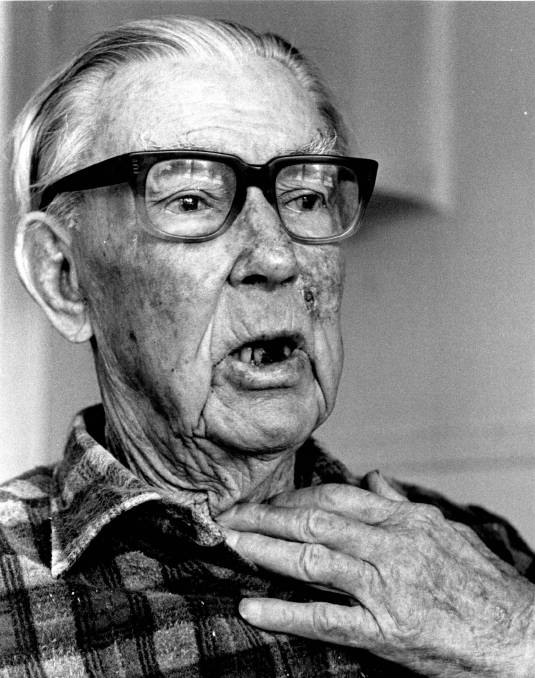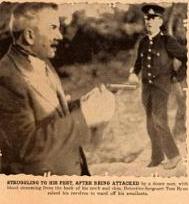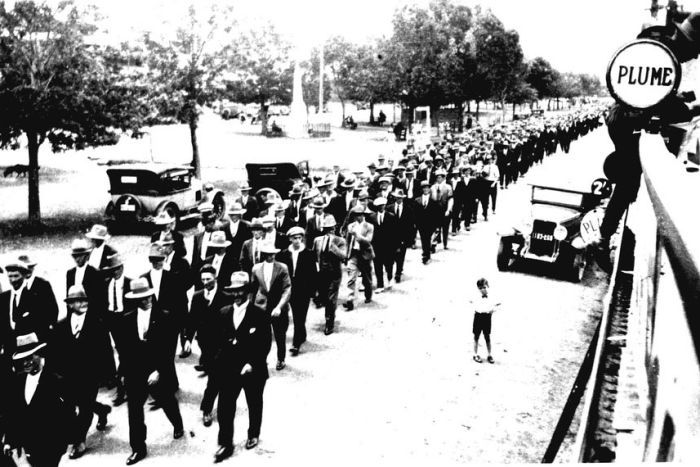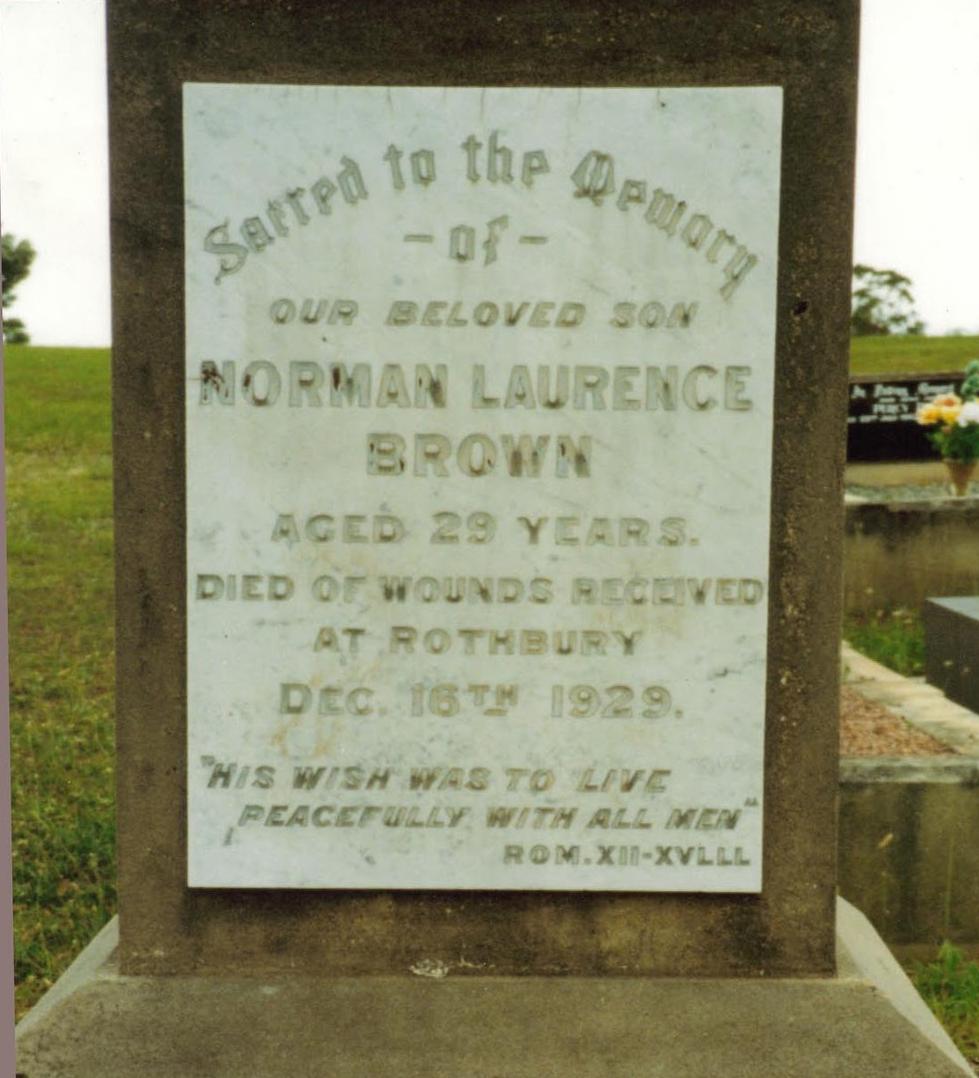We will never forget Norman Brown!
Written by: Nick G. on 16 December 2019
Today, December 16 2019, marks the ninetieth anniversary of the murder by police of Greta, NSW, coal miner Norman Brown.
Brown was one of thousands of coal miners locked out by colliery owners across northern New South Wales. The lockout was to eventually last 18 months.
On February I5, 1929, 10,000 miners received dismissal notices at 27 collieries controlled by the Northern Colliery Owners' Association. They had refused to accept a reduction of 12 per cent in contract rates and one shilling a shift for day wage men.
Thunder rolling in…
The Great Depression was eight months away from announcing itself to the world, but the storm clouds had been rolling in throughout the previous year. In 1928 the Arbitration Court ruled in favour of shipowners and ordered that Melbourne wharfies not chosen for work at the morning pick-up attend a second pick-up in the afternoon. This was a tiresome inconvenience and wharfies refused to accept it. They went on strike and scabs were brought in to defeat them. When they tried to clean the wharves of this filth they were attached by police at Prince’s Pier. They were fired on and three were injured. One, Alan Prior Whittaker, later died of his wounds.
Illegal lock-out
Brown was not on strike. Like thousands of others he was illegally locked out, and had been for eight months. The lock-out was illegal because it was in breach of an existing Award. No company directors were arrested because of it. Instead, with the support of the NSW government, scabs were enlisted to reopen the locked mines.
The Miners Federation called an aggregate meeting (a meeting of miners from different collieries) at Rothbury to demonstrate against the scabs. Six thousand miners converged on the town. At 5.30 am one group of miners tried to enter the mine to confront the scabs. They were met with armed police who fired warning shots. One man, Walter Woods, was wounded, shot in the throat. The men dispersed, but came together again at 9.30 am when a second attempt was made to scale a perimeter fence.
(Above: Woods in 1989 showing where he was shot)
A Labor MLA, Mr Baddeley, was standing near the fence. "I was chatting with one or two men when a policeman came up near me and hit one of the men—an elderly man who was just looking over the fence—on the head with his baton. The man fell to the ground . . . The policeman also hit me on the back of the head, and down I went . . . The whole trouble was provoked by that action. . . "
(Above: Det-Sgt Tom Ryan whips out his revolver)
The miners retaliated against the police attack, throwing stones over the fence and towards the police. Again, shots rang out from the police. One of them hit Brown, who had been sitting on the ground playing cards with friends and was not near the fence. He had tried to run from the source of the shooting but was struck by a bullet in the back and fell to the ground, dying not long after.
Nine other miners were wounded by police bullets that day, and 43 suffered injuries.
The funeral
The funeral of Norman Brown was held in Greta the following day. Five thousand mourners from Weston, Kurri, Cessnock, Maitland and surrounding towns attended. Feelings were high and police reported that seven shots were fired into the grounds of the Rothbury pit from lorries packed with miners returning
home from the funeral.
The Inquest
The class of people from whom Coroners are drawn is different to that of most victims of police violence. The Coroner investigating Brown’s murder not only exonerated the police, but praised them. This was despite police claiming that warning shots were only fired within the perimeter fence (Brown was outside it); that a total of 123 bullets were fired by the police; that only four men "were hit, and all by ricochets”. Testimony from miner James Dener, who ran from the fence with Brown was dismissed despite his claim that “I turned and looked back, and saw one policeman aiming, I thought directly at me.” That evidence was corroborated by Reginald Blackwell, blacksmith, of Greta, who said that the police appeared to him to be firing directly at the men. When reference was made to another witness, George Lindsay, then in hospital having been shot in the leg, who also claimed to have been deliberately shot by police, the Coroner dismissed the evidence saying, “I am not inquiring into the shooting of George Lindsay, but into the death of Norman Brown.”
The Coroner said the words: "Shoot the ——, shoot to kill" may have been used by the police, but there was no doubt it was not carried out. "I must discard evidence that the police were firing directly at the crowd from the fence,'' he added.
The Coroner found that Brown was “accidentally shot during the quelling of the Rothbury riot”. He added that the police used their arms, but exercised “ordinary skill and caution”.
In what was an obvious incitement to further murderous violence against the working class, he observed that “Magistrates, policemen, and all loyal citizens not only are entitled, but it is their duty, and they are bound to disperse an unlawful assembly such as this, and if necessary to do so by the use of force, and even by the use of firearms, according to the circumstances of the case, and to the end to be obtained."
The Aftermath
Tensions continued on the northern coalfields into 1930. In January 1930, the Workers’ Weekly published a poem that reflected the feelings of many:
ROTHBURY
Comrades, saw you not the slaughter?
Who are you that you should bide
Pain and hunger whilst you masters’
Courts may flout and laws deride?
Who are you that you should bide
Pain and hunger whilst you masters’
Courts may flout and laws deride?
Did you in your fancy, vision
Babes whose fathers might be slain,
Mothers breathing prayers of anguish
That their sons return again?
Babes whose fathers might be slain,
Mothers breathing prayers of anguish
That their sons return again?
Death enfolds no martyr nobler
Than the one you gave that day
Other heroes are forgotten,
Norman Brown will live for aye!
Than the one you gave that day
Other heroes are forgotten,
Norman Brown will live for aye!
Killed as only cowards could kill him
Knowing Right bespoke his claim—
Oh, the honor of his dying!
Oh, the everlasting shame!
Knowing Right bespoke his claim—
Oh, the honor of his dying!
Oh, the everlasting shame!
One more on the roll of honor,
Added to that costly store,
Emanating inspiration.
Fighting, fighting, more and more
Added to that costly store,
Emanating inspiration.
Fighting, fighting, more and more
Forth then let this message travel
To the limits of the earth.
From the death of him, our comrade;
Rebels shall be given birth.
To the limits of the earth.
From the death of him, our comrade;
Rebels shall be given birth.
J. GRAHAM (Kurri Kurri).
Police continued their reign of terror during the six months that followed their riot at Rothbury. “Bashers gangs” patrolled the streets of northern coalfields towns indiscriminately bashing miners at “illegal assemblies” (gatherings of three or more miners were declared illegal).
Demands raised by unions during 1930 included full compensation for all victims shot, or otherwise injured, during the lock-out; for a Royal Commission to enquire into all police activities during that period; and for the Immediate discontinuance of the employment of armed police during industrial disputes.
A large commemoration of Brown’s death was held on the first anniversary. Miners and their supporters from other unions trekked to Greta in a long procession led by the Kurri Pipers’ Band. Returned servicemen marched in the ranks.
A large commemoration of Brown’s death was held on the first anniversary. Miners and their supporters from other unions trekked to Greta in a long procession led by the Kurri Pipers’ Band. Returned servicemen marched in the ranks.
The Labor Daily reported that “Gathered around the grave of their young comrade, Norman Brown in the little cemetery at Greta today, five thousand mourners with heads bared, swore to avenge his death by concentrating upon the overthrow of the present inequitable social system.
“The pilgrimage to Greta was the most impressive ever witnessed on the coalfields.
“A remarkable feature of the pilgrimage was that not one policeman put in an appearance during the proceedings at the graveside, or at the subsequent aggregate meeting in the park.”
A memorial to Brown was then unveiled reading: "Sacred to the memory of Norman Brown, aged 29 years, who died of wounds received at Rothbury on December 16, 1929. His wish was to live peacefully with all men."
Mr. T. Hoare from the Miners’ Federation called for a verse of the workers' stirring anthem, the Red Flag. It was “fervently sung” according to the Labour Daily.
Jackson Brown, who received a police bullet in the spine invaliding him for life was with the party at the graveside.
“To Live forever….”
Norman Brown was not a Communist, nor was the Miners’ Federation or its lodges on the northern NSW coalfields under Communist leadership at the time of his death.
However, progressive worker activists and Communists have kept his memory alive down to the present day.
On 16 December 1953, the 24th anniversary of Brown’s murder, the Communist Party paper “Tribune” eulogized Brown in an article “We Remember Rothbury”. It went on to point out that in the following year, 1954, the centenary of the Eureka Rebellion, “it will be important to study Rothbury closely, to learn its lessons”. They included “the need for a new Party—a Party that really fights for the people, that leads them in their struggles, that helps them advance to Socialism.”
In 1962, progressive poet and playwright Dorothy Hewett wrote the following song which was recorded by Warren Fahey on his 1975 album “Man of the Earth”:
Ballad of Norman Brown
There was a very simple man,
Honest and quiet, yet he became
The mate of every working man,
And every miner knows his name.
Honest and quiet, yet he became
The mate of every working man,
And every miner knows his name.
Chorus
Oh Norman Brown, oh Norman Brown
The murderin' coppers they shot him down,
They shot him down in Rothbury town,
A working man called Norman Brown.
The murderin' coppers they shot him down,
They shot him down in Rothbury town,
A working man called Norman Brown.
"An honest man," the parson said,
And dropped the clods upon his head,
But honest man or not, he's dead
And that's the end of Norman Brown.
And dropped the clods upon his head,
But honest man or not, he's dead
And that's the end of Norman Brown.
Coal bosses wiped their hands and sighed,
"It is a pity that he died."
It will inflame the countryside,
And all because of Norman Brown.
"It is a pity that he died."
It will inflame the countryside,
And all because of Norman Brown.
At pit-top meetings and on strike
In every little mining town,
When miners march for bread and rights
There marches honest Norman Brown.
In every little mining town,
When miners march for bread and rights
There marches honest Norman Brown.
He thunders at the pit-top strike,
His voice is in the women's tears,
With banner carried shoulder-high
He's singing down the struggling years.
His voice is in the women's tears,
With banner carried shoulder-high
He's singing down the struggling years.
A miner's pick is in his hand,
His song is shouted through the land,
A land that's free and broad and brown,
The land that bred us Norman Brown.
His song is shouted through the land,
A land that's free and broad and brown,
The land that bred us Norman Brown.
Last chorus
Oh Norman Brown, oh Norman Brown,
The murderin' coppers they shot him down.
They shot him down in Rothbury town,
To live forever ... Norman Brown.
The murderin' coppers they shot him down.
They shot him down in Rothbury town,
To live forever ... Norman Brown.
The song can be heard here: http://ozfolksongaday.blogspot.com/2011/12/norman-brown.html
In 1989, the Women’s Auxiliary of the Miners’ Federation unveiled a plaque honouring “all of those who endured the lockout and who were at Rothbury on Monday, 16th December 1929.” Although sixty years had passed, more than 40 veterans of the shootings were present at the unveiling.
“In researching, in seeking out our veterans,” said Maree Callaghan, “we have come to learn of the difficulties endured by our grandparents. We are now also well aware of their sacrifice and recognise also that this has resulted in increased wages and better conditions in our mines today.”
The unveiling ended with the Hunter Valley People’s Chorus singing “We work the black seam”.
In 2007, a team of Hunter Valley film makers released a documentary on Rothbury titled “Lockout”.
Earlier this year, the Cessnock Library hosted an exhibition titled “The Shot Heard Around Australia”.
Honour all locked-out workers and their families and fight capitalism to the end
In remembering Norman Brown, we go beyond commemoration of an isolated historical event. We also pay tribute to all workers stood down and locked out when sections of the ruling class hold them and their families to ransom in order to break their resistance to reduced wages and conditions.
The state authorities and their institutions are in the service of the capitalist class and will always be used to protect their rule. They rule that workers should be blacklisted, sacked, arrested, fined, bashed and jailed for daring to struggle against them. The owners and their CEOs are never capsicum-sprayed or trampled by police horses when they do their dirty work against the Australian people.
We must have independence and socialism in order to break the power of the rich and establish new state institutions that serve the people and enforce the change from private to public ownership of the decisive means of production.
Print Version - new window Email article
-----
Go back
Class Struggle and Socialism
Independence from Imperialism
People's Rights & Liberties
Community and Environment
Marxism Today
International
Independence from Imperialism
People's Rights & Liberties
Community and Environment
Marxism Today
International
Articles
| Solidarity with the courageous resistance against mass deportations and the establishment of a fascist dictatorship in the USA |
| We will not be silenced about genocide |
| If you destroy children, you destroy hope |
| Unions should conduct anti-far right training |
| Australia/Gaza: Opponents of repression face increased repression |
| Parliamentary rightists…birds of a feather, all flocking together |
| Book Review: Terraglossia |
| On May Day we celebrate First Peoples’ revolutionary potential |
| Preparing to Face a Fascist Regime From the Power of President Prabowo Subianto As the Successor of New Order |
| ICOR call for International Women's Day 2025 |
| Richard Boyle case vindictive and intimidatory |
| Adelaide Survival Day: with the masses and against the masses. |
| Melbourne rallies around Invasion Day solidarity |
| Survival Day demands decolonisation |
| Civil defence a threat to civil liberties? Well, in a word, Yes. |
| A Tale of Two Pities |
| Remain firmly opposed to Zionism, anti-Semitism and all forms of racism |
| The reactionaries must condemn all terrorism, including their own |
| Media and CFMEU Administrators threaten rank and file fightback |
| Dare to struggle, dare to win against Administrator: CFMEU Sydney Rally |
-----







